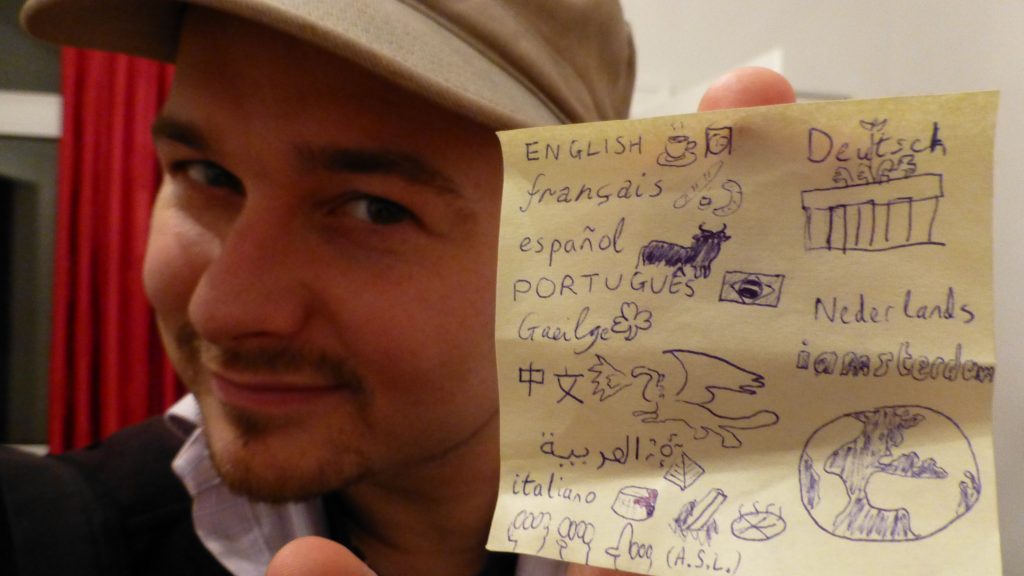Fail fast and fail often: why many failures can be the key to success

“I've missed more than 9000 shots in my career. I've lost almost 300 games. 26 times, I've been trusted to take the game winning shot and missed. I've failed over and over and over again in my life. And that is why I succeed.” – Michael Jordan
As I wrote earlier in the week, my latest language learning attempt was definitely not a success.
While some people may take this as a “sign” that their luck isn't with them, and their genes are against them, so they should give up immediately, I have found that successful people tend to simply keep on trying, despite the fact that they too face frustrating failures.
In fact, the most successful people have more failures than the average Joe because they have more experiences. The trick is that they pick themselves up, and shake it off quickly, whereas others will dwell on the mistake too long, or as the last thing they do in the project.
The ratio of successes to failures may actually be the same as someone taking on the challenge for just a few days, but the difference is whether you decide to stop at a failure, or keep going until you get as many failures as possible out of your system until the only possible outcome is that you succeed.
However, the thing is that they prefer to share and proclaim the successes. It's human nature. This can give a false impression to those who are also facing many challenges, who feel like others casually stroll through the challenge, with blessings from the (gene/astrology/luck) gods without any setbacks.
On a blog like this for instance, I prefer to keep an optimistic attitude, or if I have less than ideal conditions then I like to see what I can learn from it. I just don't see the point in being a big cry baby and whining about how unfair my life is because I have to work for things that aren't handed to me on a silver platter, as if I was the only one who had to earn things worth striving towards in life. I prefer to stay positive and encouraging, since there is enough negativity and discouragement in the language learning world already.
But I realize that this can make it feel like it's easier than it is, so today I want to share my failure CV/resume with you all! This is just a very very small sample of my many failures, and the sheer number is why I have actually indeed succeeded in so many projects. It's all about perspective.
I like the quote from Thomas Edison when he was interviewed about his “failure” to create a working light bulb, at a time when he still had yet to find a solution: “I have not failed 10,000 times. I have not failed once. I have succeeded in proving that those 10,000 ways will not work. When I have eliminated the ways that will not work, I will find the way that will work.“
Countless failed attempts to learn Spanish
My story in learning Spanish is such a huge failed attempt of not using it with many Spaniards in Ireland as a teenager, applying to an evening Spanish course in University several times in a row and not getting accepted for a ridiculous reason, being the dumbest guy in the expensive class I signed up to when I finally did join one, trying to read El señor de los anillos as a way to force myself to read consistently and giving up, thinking that studying the dictionary from A-Z would be a good idea, wasting way too much money on book courses, software, and any quirky tool I could find, and after six entire months living in Spain still not able to string together a simple sentence.
You can read the full version of this story here, where I was determined to fight this apparent “destiny” of mine to never be good at Spanish. It's even worse than the brief summary paragraph above implies – the universe was pretty clearly telling me that I was a failure at learning Spanish.
But I didn't give up.
And that's why after all the hard work, I've been awarded a C2 diploma by the Instituto Cervantes, why I've been interviewed on live radio in Spanish, learned how to dance salsa and tango through Spanish, and most importantly, used my Spanish in my travels to make new friends. I've had a lot of successes in Spanish and this is only because I've also had so many failures first.
Ready to give up on French
When I did successfully learn Spanish to a good level, I had more confidence to learn other languages, but success was far from guaranteed!
I managed to spend an entire nine months in Paris, barely progressing beyond being a functional tourist. It was a lonely experience, with it very hard for me to make friends and Parisians grimacing whenever I spoke.
One reason it was a lonely experience was that I was determined to learn French, and so had to stick to a decision to stop using so much damn English, which had given me so much success in Spanish. This unfortunately meant avoiding the international community, which would have led to way too much English being used.
Every evening back home, I tried to study, but it was really hard with the demotivating experience every time I stepped outside. I wouldn't find out until many years later the mistakes I was making in not opening my mind enough to integrate better into Paris.
While I was determined, I considered extending my time in Paris but was given a metaphorical slap in the face when offered a pathetic job contract despite lots of hard work. My work and social life were at the lowest point they had ever been and this was just feeding my low spirits and lack of progress in the language.
Despite this horrible experience, I kept working hard those nine months to reach something that I could use and rather than go home with my tail between my legs, I decided to start anew, move down south to Toulouse, and reboot my attempts to learn French to ultimately sit and pass the B2 (Upper intermediate) diploma given by the Alliance Française. Then I later moved to Quebec to really bring my level up several notches, and eventually became a professional freelance translator from French to English. Here is a video of me discussing translation in French.
I basically failed my way to success once again.
Irish
The Irish language was taught to me from when I was six years old. I had spent ten entire years of getting more or less a lesson a day, 5 days a week, throughout the school year.
Despite this, my level was so bad that I had to drop down to sit the “Ordinary level” university entrance examination. This has such ridiculously easy questions that all you need to do is look for a keyword in a question, find that word in the text you are being tested on, and copy the entire sentence as your answer. This actually requires next to zero knowledge of the language in question and this technique is pretty much the only reason I passed the exam.
Ten years. It's an immense time to go through language classes and have nothing to show for it. During my year in France, someone asked me to translate some basic phrases to Irish (such as “I love you”, and even “Hello”) and I couldn't even do this.
I resolved to change this and moved to the Gaeltacht, felt even more embarassed when Russians, Chinese and other Europeans were speaking Irish better than me, but kept at it by using the language to make new friends and studying in a more effective way that was relevant to how I really needed to use the language. After a few more visits, and lots more struggling, I had a good enough level of Irish to be interviewed on the radio in the language! This would have been impossible if I hadn't charged through all my previous failures to get over it and progress.
Chinese
Even one of my most recent language projects, just one year ago, after almost a decade of language learning experience posed me some unexpected challenges that slowed my progress down.
Rather than blame the language itself, which is surprisingly way easier than those obsessed with promoting scare tactics would have you believe, the issue was mostly due to something similar to the problem I had in Paris and a poor attempt to integrate into the local culture, making it hard to make any local friends, leading to stress and frustration.
When I got online, hoping for some support or a break, I actually had legions of Internet trolls sending me hate (note that native speakers are never this nasty; only a few select few but voicy language learners with narrow minds and sad lives), which just made me even more distracted and frustrated.
I had some days when I felt like my brain was melting, and others when I spent most of the day in frustration. But I staid on track, and this is why I reached a B1 (lower intermediate) level, and was able to converse in Mandarin after those intensive months. I'm still working on improving my level now these days.
In fact, every language learning challenge I have ever taken on has had failures, moments when I felt like giving up, times when I saw others doing much better than me that got me down, many many hours of frustration, many conversations that went nowhere, rough starts, plateaus, forgotten words that I should know, and countless other experiences that made me feel like a failure. But I kept going anyway and that's why I was ultimately successful.
Success isn't a road paved with gold, sunshine, rainbows and smiles the whole way. You will face challenges that will push you and make you feel like giving up. The trick is to fail fast and fail often. I aim to make as many mistakes as possible and experiment as much as I can to try many approaches, adapt to the problems that may arise, embrace imperfection and make sure that overall I'm going in the right direction, even if I continue to run into brick walls that I have to find ways around.
When you see someone else apparently sail through the process easily, then you are seeing a filtered view of their story with the failures removed. They are always there.
I have many other big projects ahead of me, and expect many more failures, the vast majority of which will actually be simply lower grades of successes when you look at them right, or simply lessons that I had to learn to be able to find an approach that does work. Of course, it's not about just failing, but learning from your failures. It's said that insanity is doing the same thing over and over again and expecting different results.
I also think expecting to do something once and thinking it will turn out perfectly, and if it doesn't then deciding that it's absolutely impossible, is equally insane.
Fail fast and fail often, and you'll exhaust all outcomes until you eventually find success.



Social